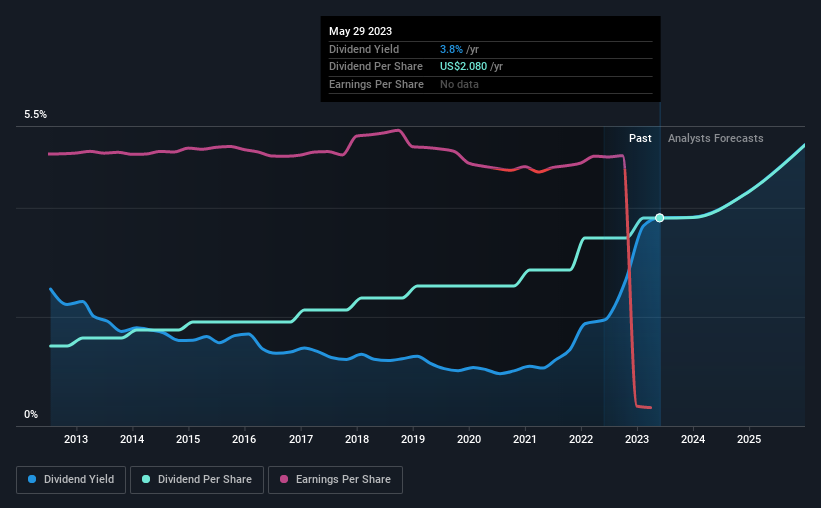- United States
- /
- Diversified Financial
- /
- NYSE:FIS
Fidelity National Information Services (NYSE:FIS) Is Increasing Its Dividend To $0.52

Fidelity National Information Services, Inc. (NYSE:FIS) will increase its dividend from last year's comparable payment on the 23rd of June to $0.52. This will take the dividend yield to an attractive 3.8%, providing a nice boost to shareholder returns.
See our latest analysis for Fidelity National Information Services
Fidelity National Information Services' Payment Has Solid Earnings Coverage
A big dividend yield for a few years doesn't mean much if it can't be sustained. Fidelity National Information Services is not generating a profit, but its free cash flows easily cover the dividend, leaving plenty for reinvestment in the business. This gives us some comfort about the level of the dividend payments.
Over the next year, EPS is forecast to expand by 116.0%. If the dividend continues on this path, the payout ratio could be 48% by next year, which we think can be pretty sustainable going forward.

Fidelity National Information Services Has A Solid Track Record
Even over a long history of paying dividends, the company's distributions have been remarkably stable. Since 2013, the dividend has gone from $0.80 total annually to $2.08. This means that it has been growing its distributions at 10% per annum over that time. It is good to see that there has been strong dividend growth, and that there haven't been any cuts for a long time.
Dividend Growth Potential Is Shaky
The company's investors will be pleased to have been receiving dividend income for some time. Let's not jump to conclusions as things might not be as good as they appear on the surface. Fidelity National Information Services' EPS has fallen by approximately 85% per year during the past five years. This steep decline can indicate that the business is going through a tough time, which could constrain its ability to pay a larger dividend each year in the future. It's not all bad news though, as the earnings are predicted to rise over the next 12 months - we would just be a bit cautious until this becomes a long term trend.
In Summary
Overall, we always like to see the dividend being raised, but we don't think Fidelity National Information Services will make a great income stock. The company is generating plenty of cash, but we still think the dividend is a bit high for comfort. We would be a touch cautious of relying on this stock primarily for the dividend income.
Market movements attest to how highly valued a consistent dividend policy is compared to one which is more unpredictable. However, there are other things to consider for investors when analysing stock performance. For instance, we've picked out 1 warning sign for Fidelity National Information Services that investors should take into consideration. If you are a dividend investor, you might also want to look at our curated list of high yield dividend stocks.
New: AI Stock Screener & Alerts
Our new AI Stock Screener scans the market every day to uncover opportunities.
• Dividend Powerhouses (3%+ Yield)
• Undervalued Small Caps with Insider Buying
• High growth Tech and AI Companies
Or build your own from over 50 metrics.
Have feedback on this article? Concerned about the content? Get in touch with us directly. Alternatively, email editorial-team (at) simplywallst.com.
This article by Simply Wall St is general in nature. We provide commentary based on historical data and analyst forecasts only using an unbiased methodology and our articles are not intended to be financial advice. It does not constitute a recommendation to buy or sell any stock, and does not take account of your objectives, or your financial situation. We aim to bring you long-term focused analysis driven by fundamental data. Note that our analysis may not factor in the latest price-sensitive company announcements or qualitative material. Simply Wall St has no position in any stocks mentioned.
About NYSE:FIS
Fidelity National Information Services
Fidelity National Information Services, Inc.
Solid track record with reasonable growth potential.
Similar Companies
Market Insights
Community Narratives



